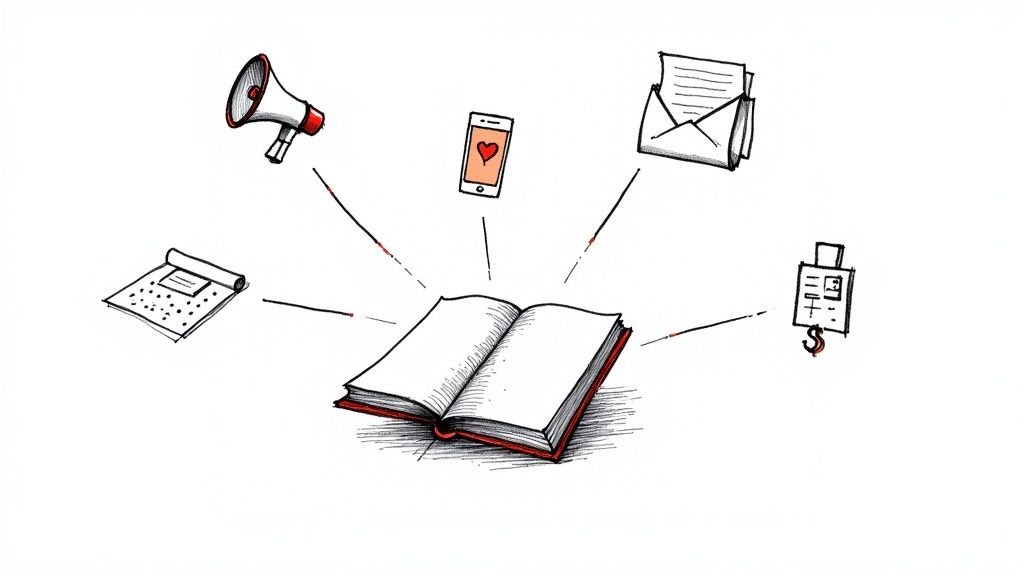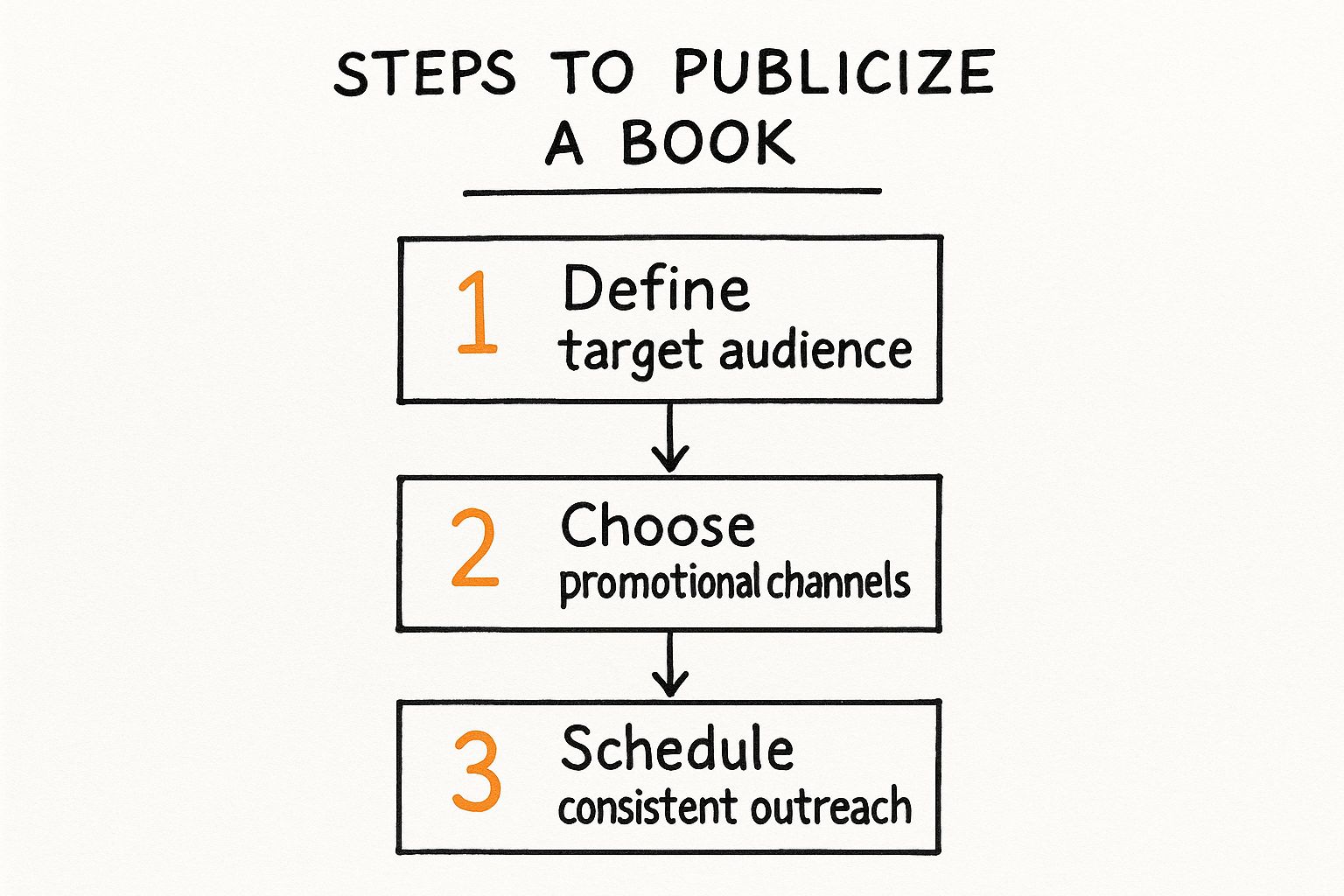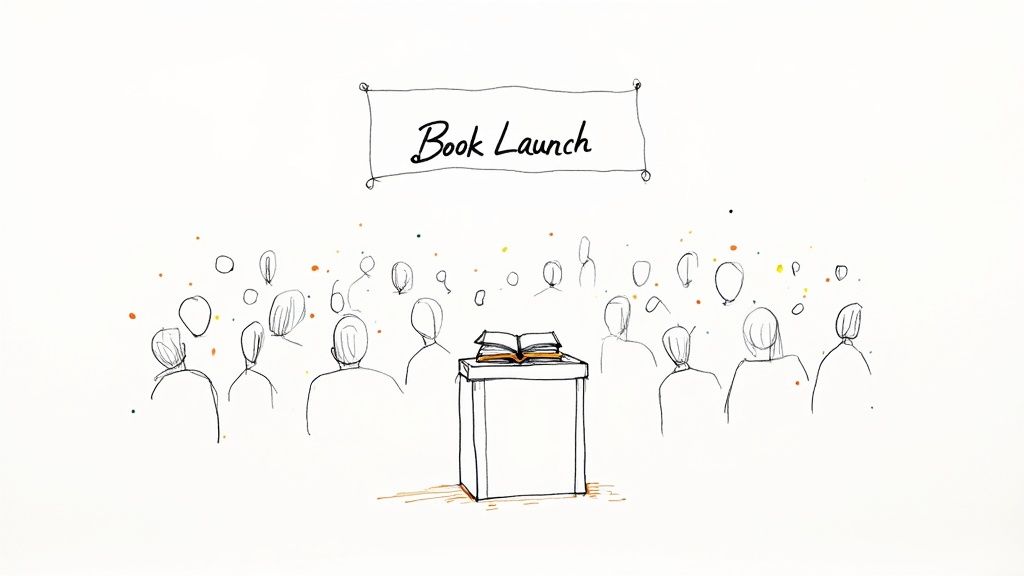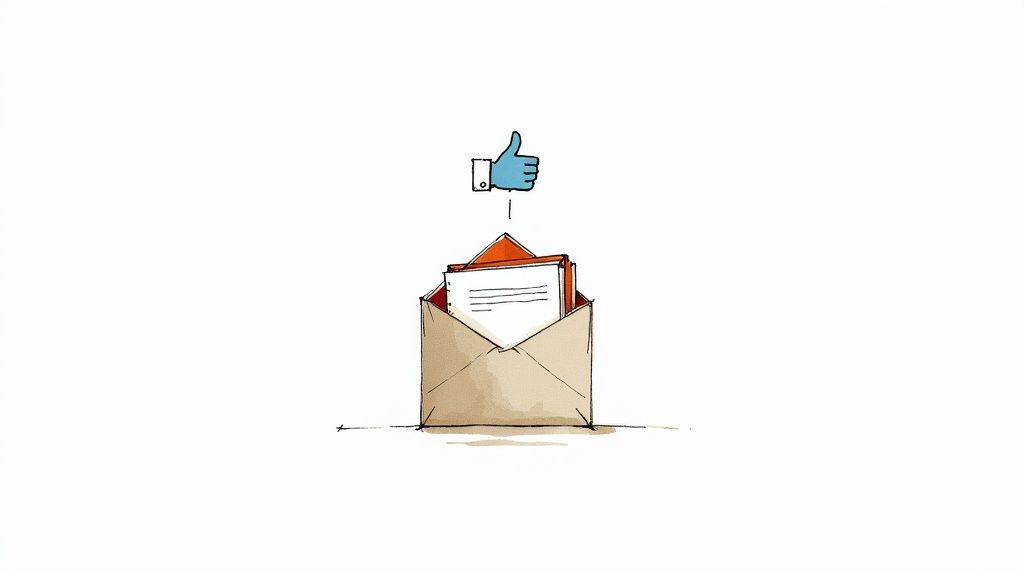How to Publicize a Book and Find Your Readers

Getting your book into the hands of readers doesn't just happen on launch day. The real work starts long before that. If you want to see real momentum, you need to lay the groundwork months in advance by building an engaged author platform, zeroing in on your ideal readers, and setting some crystal-clear goals.
This early prep work is what separates a book launch that fizzles out from one that truly takes off.
Building Your Author Platform Before Launch Day
Think of your author platform as your home base online. It's the one central spot where agents, media contacts, and—most importantly—readers can find you, learn about your writing, and join your community.
Waiting until your book is out to start building your platform is like sending out party invitations after the party has already started. You have to build the foundation first.
A professional author website is ground zero. This isn't just a fancy business card; it’s your most powerful tool for connecting with people and promoting your work. Why? Because it's the only slice of the internet you truly own and control. Your website needs to look clean, be a breeze to navigate, and instantly tell visitors who you are and what you write about.
Must-Have Elements for Your Author Website
Your website has to wear a few different hats. It's an information hub, a contact point, and a place to build a loyal following. To make it work, you absolutely need these key elements:
- An Engaging "About" Page: Don't just post a stuffy, third-person bio. Tell your story. Share why you're so passionate about your genre and what makes your perspective unique. People connect with the person behind the book.
- A Dedicated Book Page: Every single one of your books needs its own page. Make sure it includes the cover art, a description that hooks the reader, and obvious "buy now" links to all the major online stores.
- A Blog or "Updates" Section: Give people a reason to come back. Sharing regular updates—behind-the-scenes peeks at your writing process, your thoughts on the genre, or articles on related topics—keeps your audience engaged. It’s also a huge plus for search engines, helping new fans discover you.
- An Email List Sign-Up: I can't stress this enough: your email list is your single most valuable marketing asset. Offer something genuinely useful in exchange for an email address, like a free short story, a character guide, or access to exclusive content.
Another non-negotiable for your website is a professional media kit. This is simply a downloadable folder that gives journalists, podcasters, and bloggers everything they need to feature you with minimal effort. It should have your bio (in a few different lengths), high-resolution headshots, book cover images, and a compelling book summary. When you make it easy for the media to talk about you, they're much more likely to do it.
This simple flow chart really captures the essence of a solid publicity push.

As you can see, successful book publicity is a step-by-step process. Each piece builds on the one before it, creating a wave of momentum that carries you through launch and beyond.
Before you jump into pitching and outreach, it's a good idea to get your core assets in order. This checklist covers the foundational tasks that will set you up for a much smoother and more effective campaign.
Your Pre-Publicity Action Plan
| Action Item | Primary Goal | Suggested Timing |
|---|---|---|
| Finalize Author Website | Create a professional online hub for readers and media. | 3-6 months before launch |
| Create Media Kit | Make it easy for press/influencers to feature you. | 2-3 months before launch |
| Develop Email Opt-In | Start building your most valuable marketing channel. | 3-6 months before launch |
| Define Reader Persona | Know exactly who you're trying to reach. | 3-4 months before launch |
| Set Measurable Goals | Create specific targets to guide your campaign. | 2-3 months before launch |
| Build a Media/Influencer List | Identify key people to contact for publicity. | 2-3 months before launch |
Ticking these boxes early on means that when it's time for active promotion, you're not scrambling to pull things together. You're ready to execute.
Defining Your Audience and Goals
You can't hit a target you can't see. Publicizing a book is no different. "I write for science fiction readers" is way too broad to be useful.
You have to dig deeper. Are your readers die-hard fans of complex, "hard" sci-fi, or are they looking for a fast-paced space opera? Where do they actually spend their time online? Answering these kinds of questions is how you focus your energy and budget where they’ll have a real impact.
The goal here is to move from a vague genre label to a detailed reader persona. Get specific. Picture your ideal reader: What blogs do they read? What podcasts are in their library? Which authors do they already follow on social media? Your publicity plan should be laser-focused on those specific channels.
Finally, you need to set goals you can actually measure. Vague wishes like "I want to sell a lot of books" won't get you very far. You need concrete targets that will shape your entire strategy.
Here are a few examples of what strong, measurable goals look like:
- Secure 10 podcast interviews in the month before my book comes out.
- Get my book featured on 5 book blogs that have a readership of over 10,000.
- Generate at least 50 new Amazon reviews within the first 30 days of release.
When you have clear objectives like these, every decision becomes easier. You're no longer just throwing things at the wall to see what sticks; you're running a focused, strategic campaign designed to get results.
How to Get Press Coverage for Your Book

Let's talk about the kind of publicity that money just can't buy: press coverage. When a journalist, podcaster, or influential blogger decides to feature your book, it's a game-changer. It’s not just promotion; it's a powerful, third-party endorsement that tells the world your book matters.
The secret to landing these opportunities is to stop thinking like an author and start thinking like a journalist. They aren't looking for a sales pitch. They’re hunting for a great story. Your job is to show them how your book is that story—one their audience needs to hear right now.
Build a Targeted Media List
Your first job is to play detective and build a smart, targeted media list. Firing off a generic email blast to a massive, random list is a surefire way to get ignored and maybe even blacklisted. Precision is everything here.
Your mission isn’t to create the biggest list possible, but the right one.
- Bloggers & Reviewers: Find the blogs that live and breathe your specific subgenre. A thoughtful review on a niche blog with 1,000 die-hard fans can be infinitely more valuable than a blink-and-you-miss-it mention on a huge, general-interest site.
- Podcasters: Hunt down podcasts where the host and audience would genuinely get what your book is about. Take the time to listen to a few episodes. Get a feel for their style, format, and the kinds of guests they bring on.
- Local Media: Never underestimate the power of your own backyard. Local newspapers, radio shows, and TV morning segments love a good "local author makes it" story. It's a classic for a reason.
As you compile your list, don't just grab names and emails. Note what they cover, why you think they're a perfect fit, and maybe a recent article or episode you enjoyed. This homework will pay off big time when you start your outreach.
Subscribe & Get Your Free Marketing Plan Template
Receive regular updates on marketing best-practices, AI shortcuts, and get our proven 4-phase marketing roadmap for free.
Unsubscribe anytime.
Craft a Pitch That Gets Opened
Journalists and producers are drowning in emails. Hundreds a day. Your pitch has to be the life raft they want to grab onto, and that starts with the subject line. "Book Review Request" is a one-way ticket to the trash folder.
You need something specific and intriguing. Something that sounds like a story, not an ad. Think about "Story Idea: How a Sci-Fi Debut Explores AI Ethics" versus "New Sci-Fi Book." See the difference?
A great pitch is concise, personal, and offers immediate value to the media outlet's audience. Never, ever lead with "I wrote a book." Lead with the story. Lead with the hook. Lead with the unique perspective only you can offer.
Keep the email itself short and sweet. Hit them with your story angle in the first sentence or two. Briefly explain who you are and why you're the one to tell this story. Then, tie it all back to your book. End with a clear, easy-to-answer question, like, "Would you be open to receiving a review copy?"
Assemble Your Electronic Press Kit
An Electronic Press Kit (EPK) is your best friend. It’s a professional, one-stop shop that gives a busy media contact everything they need to feature you, without them having to ask. This should be a clearly marked page on your author website or a simple downloadable file.
Here's what to include in your EPK:
- High-Resolution Headshots: Have a few professional options ready, in both color and black-and-white.
- Book Cover Images: Provide high-quality JPEGs of your book cover.
- Author Bio: Prepare three versions: a short one (around 50 words), a medium one (around 150 words), and a longer one (around 300 words).
- Book Synopsis and Details: Include a compelling summary, the release date, your publisher, and direct purchase links.
- Contact Information: Make it dead simple for them to get in touch with you or your publicist.
If you’re planning any launch events, knowing how to write a formal press release is another essential skill. For a fantastic walkthrough, check out this guide on Crafting Your Event Media Release to Get Noticed.
The Art of the Follow-Up
Here’s a hard truth: most pitches are ignored on the first try. That’s why a polite, strategic follow-up isn't just a good idea—it's necessary. Give it about a week, then send a quick, friendly nudge.
It can be as simple as replying to your original email and writing, "Just wanted to gently bump this in your inbox in case it got buried. Let me know if you're interested!" For authors looking for a wider view of marketing, our guide on how to market a book covers a variety of other powerful channels.
A word of caution: don't follow up more than twice. If you still hear crickets after the second attempt, let it go and move on. Building real relationships with the media is a long game. Be professional, be respectful, and be helpful. Soon enough, you'll become a go-to source they trust and turn to again and again.
Using Social Media to Build a Community of Readers
Think of your social media presence as your most direct line to potential readers. It’s where you can turn casual followers into a genuine community. This isn't about just shouting "buy my book!" into the digital void; it’s about forging real connections that get people genuinely excited about your work—so excited they want to champion it for you.
The entire landscape of book marketing has been reshaped. The global online books market was valued at around USD 26.04 billion in 2026 and is expected to surge to USD 48.27 billion by 2034. That massive growth comes from digital formats and the powerful devices we all carry in our pockets. You can dig into more of the data in this market research report from Precedence Research.
This digital-first reality makes having a smart, active online community more critical than ever.
Choose Your Platforms Wisely
First things first: don't feel like you have to be everywhere at once. Spreading yourself too thin is a one-way ticket to burnout. The smarter move is to focus your energy on one or two platforms where your ideal readers are already hanging out.
- TikTok: If you're writing YA, romance, or fantasy, you need to be on TikTok. The #BookTok community is an absolute powerhouse, and the platform is built for short, emotional videos that grab attention.
- Instagram: As the home of #Bookstagram, Instagram is a visual playground. It’s perfect for genres that lend themselves to stunning cover reveals, aesthetic photos of your book, and behind-the-scenes Reels that give a peek into your writing life.
- Facebook: With its powerful Groups feature, Facebook is fantastic for building tight-knit fan communities. It works especially well for genres with slightly older demographics, like historical fiction, thrillers, or in-depth non-fiction.
- Goodreads: This is more than just a review site—it's a social network for dedicated readers. Running a giveaway, joining group discussions, and actually engaging with reviewers here can build incredible credibility.
By concentrating your efforts, you can really learn the unique culture of each platform. That's what leads to more authentic interactions and, ultimately, much better results. For a deeper dive, check out our guide on social media for authors for more platform-specific advice.
Create Content That Connects
Here's the golden rule for authors on social media: 80% connection, 20% promotion. Your feed should feel like a conversation, not a constant commercial. The real goal is to make your followers feel like they're part of your journey.
The most successful authors on social media don't just sell a product; they invite readers into their world. They share the struggles, the small wins, and the passion behind the pages. This authenticity is what builds a loyal community that feels personally invested in your success.
Need some ideas that go beyond yet another sales pitch?
- Behind-the-Scenes Glimpses: Post a photo of your messy desk, share a screenshot of a paragraph that took you all day to write, or talk about the playlist you have on repeat.
- Character Spotlights or Q&As: Introduce your characters one by one. You could even get creative and host a live Q&A where you answer questions as your main character.
- Interactive Polls and Questions: Ask your followers simple, fun questions. "Coffee or tea while reading?" or "What's a book you stayed up all night to finish?" This builds engagement and gives you insight into who your readers are.
- Cover Reveals and Excerpt Teasers: Turn your launch milestones into genuine events. A multi-stage cover reveal can build incredible hype. Sharing a single tantalizing paragraph a week before launch can really whet your readers' appetites.
Putting proven strategies in place to boost social media engagement is how you cultivate this kind of community around your book. Your best tools are consistency and being yourself.
Engage and Collaborate with Your Community
Remember, building a community is a two-way street. It’s not enough to just post content—you have to actually interact with the people who take the time to follow you.
Engagement Checklist
| Action | Why It Matters |
|---|---|
| Respond to Comments | Shows you're actually listening and that you value your followers' input. |
| Share User-Generated Content | Reposting a reader's photo of your book is powerful social proof and makes them feel seen. |
| Collaborate with Bookstagrammers | Partner with influencers in your genre for reviews, account takeovers, or interviews. |
| Run Giveaways and Contests | This is a fantastic way to thank your existing community and attract new followers. |
Your social media channels are the digital version of a town square. So be present, be helpful, and most importantly, be human. When you foster a real community, you aren't just finding buyers for one book—you're cultivating lifelong fans who will be excited for every single book you write.
Connecting with Readers Through Events and Partnerships

While your online strategy is crucial, there's a certain magic that happens when you connect with readers directly. Nothing transforms a casual follower into a devoted fan quite like a real interaction, even if it's just through a screen. Events, both in-person and virtual, create powerful, memorable moments that spark genuine buzz and the kind of word-of-mouth marketing money can't buy.
The secret is to think beyond the classic bookstore signing. Of course, those can be great, but they're just one tool in a much larger toolbox. The most successful events I've seen are creative, offer genuine value, and give people a compelling reason to show up and engage with you and your work.
Beyond the Bookstore Signing
Let's be honest: the traditional book signing can be a pretty passive experience for everyone involved. To really make an impact and publicize your book effectively, you need to create events that are active, engaging, and unforgettable. This mindset immediately expands your reach far beyond the four walls of a single store.
Think about hosting more dynamic events:
- Run a Workshop: If you've written non-fiction, this is a no-brainer. Teach a concept straight from one of your chapters. A cookbook author can host a cooking class. A business author can run a mini-seminar on a key strategy. You’re giving them a tangible skill, which is incredibly valuable.
- Give a Library Talk: Libraries are true community hubs, and they're always looking for great programming. A talk about your research process, your book’s core theme, or even just your personal journey as an author can draw in a dedicated and curious audience.
- Get on a Festival Panel: Speaking at a literary or genre-specific festival instantly positions you as an expert. More importantly, it exposes your book to hundreds of passionate readers who are already there to discover new authors.
The goal here is to shift your mindset. You're not just asking people to buy your book; you're offering them a unique experience they can't get anywhere else.
The most impactful author events aren't just about selling copies; they're about building a community. When you give readers a memorable experience—whether it's learning a new skill or gaining a new perspective—you earn their loyalty and turn them into advocates for your work.
The Power of Strategic Partnerships
Remember, you don't have to do all this alone. Partnering with other people and businesses is one of the smartest ways to tap into new, relevant audiences who might not have found you otherwise. The right collaboration can literally double your promotional power overnight.
Your job is to find partners whose audiences align with your book's themes and your ideal reader.
A Few Partnership Ideas to Get You Started
| Partner Type | Event Idea | Why It Works |
|---|---|---|
| Local Businesses | A fantasy author partners with a local game store for a book talk and game night. | You're cross-promoting to an audience with overlapping interests in world-building and epic storytelling. It’s a natural fit. |
| Other Authors | Two thriller authors co-host a "Meet the Authors" night at a local bar or café. | You both promote to your separate email lists and social media followers, effectively doubling your reach for a single event. |
| Book Clubs | Offer a 20-minute virtual Q&A for any book club that chooses your title. | This creates a deeply personal connection and fuels powerful word-of-mouth recommendations within a tight-knit reading group. |
Engaging Your Audience Online
What if your readers are scattered all over the globe? That’s where virtual events come in. These aren't just watered-down versions of in-person events; they are unique opportunities to connect directly with fans no matter where they are.
An Ask Me Anything (AMA) session on Instagram Live, YouTube, or in a private Facebook Group allows for spontaneous and authentic conversation. Just be sure to announce it a few days ahead of time to build some anticipation. It also helps to come prepared with a few seed questions to get the ball rolling.
This kind of direct access makes your followers feel seen and valued, like they're part of an exclusive community. That's the stuff that builds the loyal support system that keeps a book selling long after launch week is over.
Smart Ways to Use Paid Ads for Your Book
While organic marketing builds a fantastic foundation, paid advertising is what gives your book the targeted push it needs to find whole new groups of readers. It's how you put your book directly in front of people who are primed to love it but just don't know it exists yet.
Thinking about paid ads can feel a little overwhelming, but with a smart approach, it becomes one of the most powerful tools in your publicity kit. The secret isn't about shouting into the void; it's about precision.
Where to Spend Your Advertising Budget
Let’s be honest, not all ad platforms are created equal for authors. You'll get the most bang for your buck by focusing on the big three where readers are most receptive: Amazon Ads, Facebook/Instagram Ads, and BookBub Featured Deals. Each one plays a unique role in a well-rounded strategy.
The digital book world is massive and only getting bigger. By 2026, ebooks are on track to generate $17.7 billion in global annual revenue. The audiobook market is also exploding, hitting $1.6 billion back in 2021. Just look at the power of good promotion: Colleen Hoover's It Ends with Us sold over 2.7 million copies in 2022, largely thanks to its online buzz. This shows a huge digital audience just waiting to be reached.
Amazon Ads: This is ground zero. Your ads show up right on Amazon product pages, in search results, and even on Kindle devices. You're catching readers when they're already in a shopping mindset—it doesn't get more direct than that.
Facebook & Instagram Ads: These platforms are incredible for building an audience from scratch. Their targeting is so powerful you can reach users based on their interests, the authors they follow, genres they love, and even book-related pages they've liked.
BookBub Featured Deals: This isn't your typical ad platform; it’s more of a curated, high-impact promotion. Getting a Featured Deal is tough, no doubt, but it can trigger thousands of sales in a single day by blasting your discounted ebook to a gigantic list of ravenous readers.
Designing Ads That Stop the Scroll
In a crowded social media feed, you have a split second to grab someone's attention. Your ad's creative is what earns that precious click, so it needs to be visually striking and have a crystal-clear message.
If you're new to the pay-per-click world, it's worth getting a handle on the fundamentals. I'd recommend checking out a complete guide to PPC for beginners to get your bearings.
Every effective ad you run needs three core elements:
- A Compelling Image: Your book cover is the star of the show. Make sure it's a high-quality file that looks great and is easy to read, even as a tiny thumbnail on a phone.
- Punchy Ad Copy: You have to start with a hook. It could be a gripping one-sentence summary, a provocative question, or a direct comparison to a bestseller everyone knows.
- A Clear Call-to-Action (CTA): Tell people exactly what you want them to do next. "Shop Now," "Learn More," or "Download a Sample" are direct, effective, and leave no room for confusion.
The goal of your ad isn't just to get a click; it's to get the right click. By targeting readers who love authors like you and presenting them with an ad that speaks their language, you ensure your marketing dollars are spent efficiently.
Imagine you're a romance author. You might run a Facebook ad targeting fans of Emily Henry with a vibrant image of your cover and copy like, "Love a witty, heartfelt rom-com? Meet your next book obsession." It's specific, it's relevant, and it speaks directly to the reader you're trying to attract. For more ideas and platform-specific strategies, our comprehensive guide to effective ads for indie authors has detailed examples across multiple advertising platforms.
Budgeting and Analyzing Your Ad Performance
You don't need a Hollywood budget to see results. I always tell authors to start small. Even $5-$10 per day on a platform like Amazon or Facebook can generate a ton of valuable data.
From there, the most important thing you can do is track your results.
Keep a close eye on key metrics like your Click-Through Rate (CTR) and, especially on Amazon, your Advertising Cost of Sale (ACoS). This data is your roadmap—it tells you exactly what’s working and what’s falling flat.
If an ad isn't performing well, don't be afraid to pull the plug. Pause it, tweak the copy or the targeting, and try again. It's this cycle of testing and optimizing that turns a small initial investment into a reliable, profitable sales engine for your book.
Keeping Your Book Relevant After the Launch

That initial rush of publicity when your book launches is fantastic, isn't it? But the authors who build real, lasting careers know that the work has just begun. The secret is to stop thinking of your book launch as a finish line and start seeing it as the starting pistol for a marathon. Once the launch week excitement dies down, your long-term strategy kicks into gear.
The good news is that you're playing in a massive and ever-expanding field. The global book market is projected to reach an incredible USD 142.72 billion by 2026. This isn't just a number; it's proof that there are always new readers waiting to discover your work, whether in established markets like North America or high-growth areas in the Asia Pacific region. You can dig deeper into these trends and discover insights into the global books market here. This sustained demand means your book's potential audience is never truly tapped out—if you know how to keep it in front of them.
Use Your Early Wins as Leverage
All that momentum you built during launch week? Don't let it go to waste. Those first glowing reviews, the podcast interview you landed, and your initial sales numbers aren't just memories. They're your currency for the next phase of your publicity push.
Your initial press coverage and reader reviews provide the social proof needed to approach bigger opportunities. Use a glowing review from a small blog as leverage to pitch a larger one. Mention your strong launch-week sales rank when you reach out to podcast hosts.
Think of it like building a case. Every piece of positive feedback is another piece of evidence that your book is worth someone's time. I always advise authors to create a "Praise" or "Press" page on their website to collect all these great soundbites. It makes it incredibly easy for a busy journalist or event organizer to see your credibility in a single glance.
Keep Your Book in the Conversation
To stay relevant months or even years after publication, you have to get creative and find new reasons for people to talk about your book. This is all about connecting your book's themes to what's happening in the world right now.
Here are a few tactics I've seen work wonders for authors:
Tie-ins with Holidays and Seasons: Got a heartwarming family saga? It’s a perfect fit for a Mother’s Day or holiday promotion. A thriller set on a beach? Run a price drop at the start of summer. Think about the calendar and find your hook.
Breathe New Life into Your Content: Your book is a goldmine of material. Pull out a compelling chapter and rewrite it as a guest post. Take a minor character and write a short story about them as an exclusive for your newsletter subscribers. Turn the core ideas from your non-fiction book into a shareable infographic.
Pitch an Update or Follow-Up: Did your book touch on a topic that’s still in the news? Reach out to the journalists and bloggers who covered you before with a new angle. For example, if you wrote about a financial trend, you could pitch a "What's Changed One Year Later?" story.
By constantly finding fresh ways to connect your book to current conversations, you give both readers and the media a compelling reason to pay attention long after launch week. This is how you build a book that doesn't just launch, but lasts.
Answering Your Top Book Publicity Questions
Diving into book publicity for the first time? It's natural to have questions. I’ve been there. Let’s walk through some of the most common ones I hear from authors, so you can build a marketing plan that feels less overwhelming and a lot more effective.
How Much Money Do I Need for Book Publicity?
This is the million-dollar question, isn't it? The truth is, there's no magic number. You can get started with almost nothing if you're willing to put in the sweat equity, or you can invest several thousand dollars to hire a professional publicist.
A practical way to think about it is to earmark a percentage of what you realistically expect to make in first-year royalties. If you're just starting out, focus your initial funds on the things that give you the most bang for your buck, like a killer cover design and some targeted Amazon Ads. For authors seeking professional support without the high cost of traditional publicists, our guide to affordable book marketing services compares 11 budget-friendly options from $35 to full-service agencies. You can start small, see what actually sells books, and then reinvest the profits into what's working.
Key Takeaway: You don't need a massive budget to make a splash. What you need is a smart strategy. Put your money where you can see a clear return, and scale up from there as you learn what resonates with your audience.
When Should I Actually Start Promoting My Book?
Way earlier than you probably think. Ideally, you should start building your author platform—your home base online with a website, email list, and social media presence—at least 6 to 12 months before you plan to launch. This gives you time to gather a community of readers who are genuinely excited for your book to come out.
The more active, in-your-face publicity blitz should kick off about 3 to 4 months before release day. This is when you start sending out advance reader copies (ARCs) and pitching your book to journalists, podcasters, and bloggers. You need that lead time to land interviews and features that can go live right around your launch, creating that critical buzz.
Can I Really Publicize a Book Without Using Social Media?
Absolutely. It's totally possible, but you have to be honest with yourself: it means you'll need to work harder on other fronts. If you're ditching social media, you can't just ignore marketing altogether. You have to double down elsewhere.
Here’s where I’d focus my energy:
- Your Email List: This becomes your non-negotiable, number-one priority. It’s the most direct and reliable way to reach your readers.
- Media Outreach: Get scrappy. Spend serious time pitching yourself as a guest on podcasts and for features on blogs your target readers love.
- Paid Ads: Put a budget, even a small one, toward platforms like Amazon Ads or BookBub to get your book directly in front of active buyers.
- Strategic Partnerships: Team up with other authors, organizations, or influencers in your niche. They can introduce your book to their followers, giving you instant credibility.
Feeling like you're drowning in marketing to-dos? ManuscriptReport.com can be a lifesaver. Our AI tools can whip up a full marketing kit for your book—blurbs, ad copy, social media content, keywords, and more—in about 10 minutes. It's a great way to stop stressing over promotion and get back to what you love: writing your next book. See how it works at ManuscriptReport.com.
Enjoyed this article? Subscribe for more + get a free marketing roadmap template.
Receive regular updates on marketing best-practices, AI shortcuts, and get our proven 4-phase marketing roadmap template for free.
Unsubscribe anytime.
Related Articles

6 Essential Book Marketing Strategies for Romance Novels
Discover 6 proven strategies to market your romance novel effectively and boost sales.

7 Essential Book Giveaway Strategies to Build Loyalty
Discover 7 essential book giveaway strategies to boost reader loyalty and engagement.

AI Keyword Research for Books to Boost Sales
Unlock your book's potential with AI keyword research for books. Learn how to find reader-focused keywords and integrate them to dominate digital bookshelves.